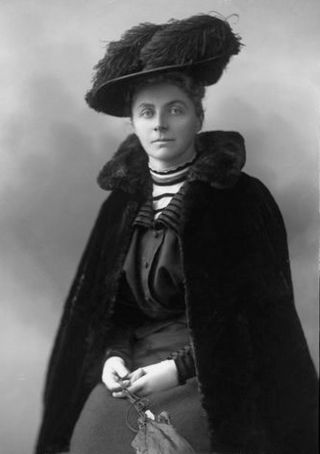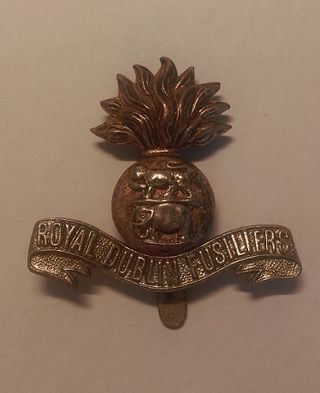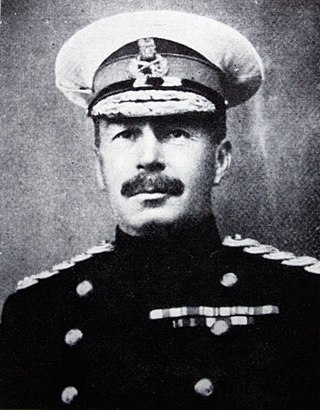Related Research Articles

The Second Boer War, also known as the Boer War, the Anglo–Boer War, or the South African War, was a conflict fought between the British Empire and the two Boer Republics over the Empire's influence in Southern Africa from 1899 to 1902.

The South West Africa campaign was the conquest and occupation of German South West Africa by forces from the Union of South Africa acting on behalf of the British imperial government at the beginning of the First World War.

The South Staffordshire Regiment was a line infantry regiment of the British Army in existence for only 68 years. The regiment was created in 1881 under the Childers Reforms by the amalgamation of the 38th Regiment of Foot and the 80th Regiment of Foot. The regiment saw service in the Second Boer War, World War I and World War II.

The 8th Infantry Division was an infantry division of the British Army that was active in both the First and Second World Wars. The division was first formed in October 1914 during the First World War, initially consisting mainly of soldiers of the Regular Army and served on the Western Front throughout the war, sustaining many casualties, before disbandment in 1919. The division was reactivated in Palestine, under the command of Major-General Bernard Montgomery, in the late 1930s in the years running up to the Second World War before being disbanded in late February 1940. It was briefly reformed in Syria in an administrative role during 1942-3.

Emily Hobhouse was a British welfare campaigner, anti-war activist, and pacifist. She is primarily remembered for bringing to the attention of the British public, and working to change, the deprived conditions inside the British concentration camps in South Africa built to incarcerate Boer and African civilians during the Second Boer War.

The Defence of the Realm Act (DORA) was passed in the United Kingdom on 8 August 1914, four days after it entered the First World War and was added to as the war progressed. It gave the government wide-ranging powers during the war, such as the power to requisition buildings or land needed for the war effort, or to make regulations creating criminal offences.
The Maritz rebellion, also known as the Boer revolt or Five Shilling rebellion, was an armed insurrection in South Africa in 1914, at the start of World War I. It was led by Boers who supported the re-establishment of the South African Republic in the Transvaal. Many members of the South African government were themselves former Boers who had fought with the Maritz rebels against the British in the Second Boer War, which had ended twelve years earlier. The rebellion failed, and its ringleaders received heavy fines and terms of imprisonment.

The cinema of South Africa refers to the films and film industry of the nation of South Africa. Many foreign films have been produced about South Africa.

The Royal Dublin Fusiliers was an infantry regiment of the British Army created in 1881 and disbanded in 1922. It was one of eight 'Irish' regiments of the army which were raised and garrisoned in Ireland, with the regiment's home depot being located in Naas. The regiment was created via the amalgamation of the Royal Bombay Fusiliers and Royal Madras Fusiliers, two army regiments stationed in India, with militia units from Dublin and Kildare as part of the Childers Reforms. Both battalions of the regiment served in the Second Boer War.

The Gordon Highlanders was a line infantry regiment of the British Army that existed for 113 years, from 1881 until 1994, when it was amalgamated with The Queen's Own Highlanders to form The Highlanders. Although the 'Gordon Highlanders' had existed as the 92nd Regiment of Foot since 1794, the actual 'Gordon Highlanders Regiment' was formed in 1881 by amalgamation of the 75th (Stirlingshire) Regiment of Foot and 92nd Regiment of Foot.

Major-General Sir Henry Timson Lukin was a South African military commander. He fought in the Anglo-Zulu War (1879) and the Basutoland Gun War (1880–1881), the Bechuanaland Campaign (1897), and the Anglo-Boer War when he was in command of the artillery during the defence of Wepener for which action he was awarded a Distinguished Service Order. From 1900 to 1901 he commanded the Cape Mounted Riflemen, from 1904 to 1912 he was Commandant-General of the Cape Colonial Forces and in 1912 Inspector-General of the Permanent Force of the Union of South Africa.

The Royal Sussex Regiment was a line infantry regiment of the British Army that was in existence from 1881 to 1966. The regiment was formed in 1881 as part of the Childers Reforms by the amalgamation of the 35th Regiment of Foot and the 107th Regiment of Foot. The regiment saw service in the Second Boer War, and both World War I and World War II.

Alfred Paget was an English silent film actor best known for his portrayal of Prince Belshazzar in D.W. Griffith's 1916 historical epic Intolerance. He appeared in more than 230 films between 1908 and 1918. Prior to his film career, he had served from 1899 to 1903 in the Royal Horse Guards of the British Army.

The Scottish Horse was a Yeomanry regiment of the British Army's Territorial Army raised in 1900 for service in the Second Boer War. It saw heavy fighting in both the First World War, as the 13th Battalion, Black Watch, and in the Second World War, as part of the Royal Artillery. It amalgamated with the Fife and Forfar Yeomanry to form the Fife and Forfar Yeomanry/Scottish Horse in 1956. The lineage is maintained by "C" Fife and Forfar Yeomanry/Scottish Horse Squadron of The Scottish and North Irish Yeomanry based in Cupar in Fife.
Killarney Film Studios was a South African film studio established in Johannesburg by New York native and business tycoon Isidore W. Schlesinger in 1915 and is regarded as "the first motion picture studio in Africa". Schlesinger moved to South Africa in 1894, against his family's wishes, when he read about the discovery of gold in Witwatersrand. In 1913, having accumulated wealth throughout various ventures, he ventured in to the entertainment industry in 1913 when he purchased the Empire Theatre in Johannesburg for £60,000 and converted what was an "insolvent" business into a flourishing one named African Consolidated Theatres, which worked on the national distribution of content like variety shows and films from the Cape of Good Hope to the Zambezi River.

Afrikaners are a South African ethnic group descended from predominantly Dutch settlers first arriving at the Cape of Good Hope in 1652. Until 1994, they dominated South Africa's politics as well as the country's commercial agricultural sector. Afrikaners make up approximately 5.2% of the total South African population, based upon the number of White South Africans who speak Afrikaans as a first language in the South African National Census of 2011. Afrikaans, South Africa's third most widely spoken home language, evolved as the mother tongue of Afrikaners and most Cape Coloureds. It originated in the Dutch vernacular of South Holland, incorporating words brought from the Dutch East Indies and Madagascar by slaves.

Clotilde Augusta Inez Mary Graves, known as Clo. Graves, was an Irish author who wrote under the pseudonym of Richard Dehan, becoming a successful playwright in London and New York City.
Fred Paul (1880–1967) was a Swiss-born British actor and film director. Paul was born in Lausanne in 1880 but moved to Britain at a young age. He was a prolific actor and director in the 1910s and 1920s, but his career dramatically declined with the arrival of sound films.
Boerehaat is an Afrikaans word that means "ethnic hatred of Boers" or Afrikaners as they became known after the Second Boer War. The related term Boerehater has been used to describe a person who hates, prejudices or criticises Boers or Afrikaners.
South Africa's participation in the First World War occurred automatically when the British Government declared war on Germany in August 1914. Due to her status as a Dominion within the British Empire, South Africa, whilst having significant levels of self-autonomy, did not have the legal power to exercise an independent foreign policy and was tied to the British declaration.
References
- 1 2 "The Dop Doctor (1915)". BFI. Retrieved 20 October 2020.
- 1 2 "The Dop Doctor". 21 January 1916. Retrieved 20 October 2020.
- ↑ Parsons, Neil (1 September 2013). "Nation-Building Movies Made in South Africa (1916–18): I.W. Schlesinger, Harold Shaw, and the Lingering Ambiguities of South African Union". Journal of Southern African Studies. 39 (3): 641–659. doi:10.1080/03057070.2013.827003. S2CID 143079921 . Retrieved 20 October 2020.
- ↑ "The Dop Doctor". Argus (Melbourne, Vic. : 1848 - 1957). 17 June 1916. p. 19. Retrieved 20 October 2020.